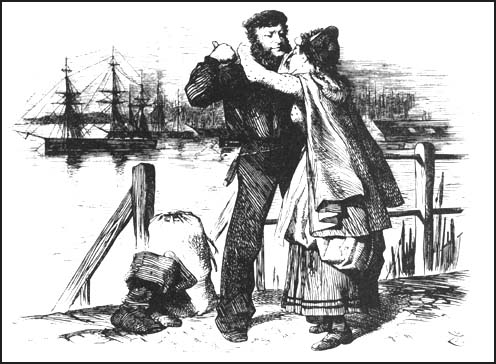|
Some Major Domestic Reforms
|
|
Punch Cartoon of 1867
|
1867 REFORM ACT
In March 1860 Lord John Russell attempted to introduce a new Parliamentary Reform Act that would reduce the qualification for the franchise to �10
in the counties and �6 in towns, and effecting a redistribution of seats. Lord Palmerston, the prime minister, was opposed to parliamentary reform, and
with his lack of support, the measure did not become law.
On the death of Palmerston in July 1865, Earl Russell (he had been raised to the peerage in July 1861) became prime minister. Russell, with the once
again tried to persuade Parliament to accept the reforms that had been proposed in 1860. The measure receive little support in Parliament and was not
passed before Russell's resignation in June 1866. William Gladstone, the new leader of the Liberal Party, made it clear that like Earl Russell, he was also
in favour of increasing the number of people who could vote.
Although the Conservative Party had opposed previous attempts to introduce parliamentary reform, Lord Derby's new government were now
sympathetic to the idea. The Conservatives knew that if the Liberals returned to power, Gladstone was certain to try again. Benjamin Disraeli, leader of
the House of Commons, argued that the Conservatives were in danger of being seen as an anti-reform party. in 1867 Disraeli proposed a new Reform
Act. Lord Cranborne (later Lord Salisbury) resigned in protest against this extension of democracy. In the House of Commons, Disraeli's proposals
were supported by Gladstone and his followers and the measure was passed.
The 1867 Reform Act gave the vote to every male adult householder living in a borough constituency. Male lodgers paying �10 for unfurnished rooms
were also granted the vote. This gave the vote to about 1,500,000 men.
The Reform Act also dealt with constituencies and boroughs with less than 10,000 inhabitants lost one of their MPs. The forty-five seats left available
were distributed by: (i) giving fifteen to towns which had never had an MP; (ii) giving one extra seat to some larger towns - Liverpool, Manchester,
Birmingham and Leeds; (iii) creating a seat for the University of London; (iv) giving twenty-five seats to counties whose population had increased since
1832.
|

|
1874 MERCHANT SHIPPING ACT
In the 1868 General Election, Samuel Plimsoll was elected as MP for Derby. He immediately began to campaign for government legislation to protect
seamen. To support his case he published Our Seamen (1873), a book that provided documentary evidence about the scale of the problem. This
included information that nearly 1,000 sailors a year were being drowned on ships around British shores. As part of his campaign, a copy of Our
Seamen was given to every member of the House of Commons.
Samuel Plimsoll was particularly critical of the 1871 Merchant Shipping Act. As a result of this legislation seamen were obliged, subject to
imprisonment and fine, to go to sea and complete a voyage once they had signed a contract. This made it difficult for sailors to leave a ship once they
realised it was unseaworthy. In March 1873, The Times joined Plimsoll's campaign by printing a story about fifteen seamen who had been imprisoned
for three months after they refused to go on board the ship Peru. When the ship finally left Cardiff with a new crew, it sunk in the Bay of Biscay and
three men were drowned.
Ship-owners had powerful supporters in the House of Commons and it was argued by them that the government should not pass legislation that
restricted the freedom of employers to run their companies. Gradually, other politicians, such as Lord Shaftesbury, became involved in Plimsoll's
campaign. In 1875 Benjamin Disraeli, the Conservative prime minister, changed his mind on the issue and in 1875 gave his support to an Unseaworthy
Vessels Bill.
The following year Samuel Plimsoll managed to persuade Parliament to amend the 1871 Merchant Shipping Act. This provided for the marking of a
line on a ship's sides which would disappear below the water line if the ship was overloaded. A further amendment in 1877 imposed a limit on the
weight of cargo which vessels were permitted to carry and created rules governing the engagement of seamen and their accommodation on board ship.
|
Polly: "O, Dear Jack! I can't help crying, but I'm so happy to think you're not going in one of those dreadful ships!" ..... Jack: "No, No, lass - never more - thanks to our friend Master Plimsoll, God bless him."
|

|
|
Industry
|
1875 CONSPIRACY AND PROPERTY PROTECTION ACT
After the 1874 General Election Benjamin Disraeli and the Conservative Party formed the government. As promised, Disraeli passed new legislation
concerning trade unions. The Conspiracy and Protection of Property Act established the principle that a trade union could not be prosecuted for an
act which would be legal if performed by an individual. For example, it was not illegal for an individual to stop work, therefore a union could not be
prosecuted if it organised a strike. Under this act peaceful picketing was allowed to take place during industrial disputes.
|

|
|
|
Favorite Links
|

|